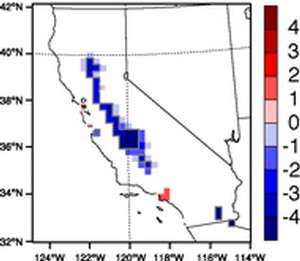Agriculture is bad for the environment
Wish I had a nickel for each time I have heard this in some form or another. How about agriculture being an anodyne against the warming trend we are currently experiencing. That get your attention?
From
Science Now:
Cultivating a Defense Against Global Warming
California agriculture may provide more than just avocados, artichokes, and grapes. Crops could also be keeping the state cooler, according to a new climate modeling study.
Most discussion to date about how land use can influence climate has focused on urban heat islands. Pavement and buildings trap the sun's warmth and block evaporation, raising the local temperature. But other land uses may also have an impact. California is by far the U.S.'s largest agricultural producer: 13.5% of the state, or more than 34,000 square kilometers, is agricultural land, and the majority of that land is irrigated. A team of climate scientists at the University of California, Santa Cruz, led by ecosystems scientist Lara Kueppers, now at the University of California, Merced, wondered if all this water being sprayed around could have a measurable effect on climate.
The team used a regional climate model to compare temperatures in the state with and without agriculture between 1980 and 2000. For the agricultural scenario, the researchers plugged in urban and agricultural land use data from about 1990 and kept it constant for 20 years. For the nonirrigated scenario, they replaced urban and agricultural land with natural vegetation similar to neighboring areas. Kueppers found that irrigation can indeed have a significant cooling effect, particularly during the summer months. On average, the mean temperature during August was 3.7°C lower in areas with irrigated crops, and the maximum temperature dropped an average of 7.5°C. For California as a whole, irrigation swamped the urban heat island effect, and the mean August temperature was on average 0.38°C lower than it would have been without farms. The same effect is likely to occur in any arid region where crops are irrigated, the researchers report in this month's issue of Geophysical Research Letters.
The findings indicate that agriculture may have partially shielded California from global warming over the past 150 years, a period that coincides with the expansion of agriculture in the state. "Maybe things would have warmed much more if there hadn't been irrigation," says climate scientist David Lobell of Lawrence Livermore National Laboratory in Livermore, California. Kueppers' modeling results match Lobell's own observations, which have shown warming for most of the state during the summer, except for areas with irrigated agriculture. This effect could explain why climate models get it wrong in those areas, he says. But in the future, agriculture won't be expanding in California's expensive real estate market. So, the irrigation effect will likely flatten out while the greenhouse effect continues to intensify.

The agriculture is in the Central Valley and that is where the cooling is. Enough; according to the report; to offset the Urban Heat island effects of the coastal cities leaving CA a few tenths of a degree cooler overall. Plus, we get to eat all the tasty produce. What's not to love...
Posted by DaveH at March 3, 2007 8:50 PM
